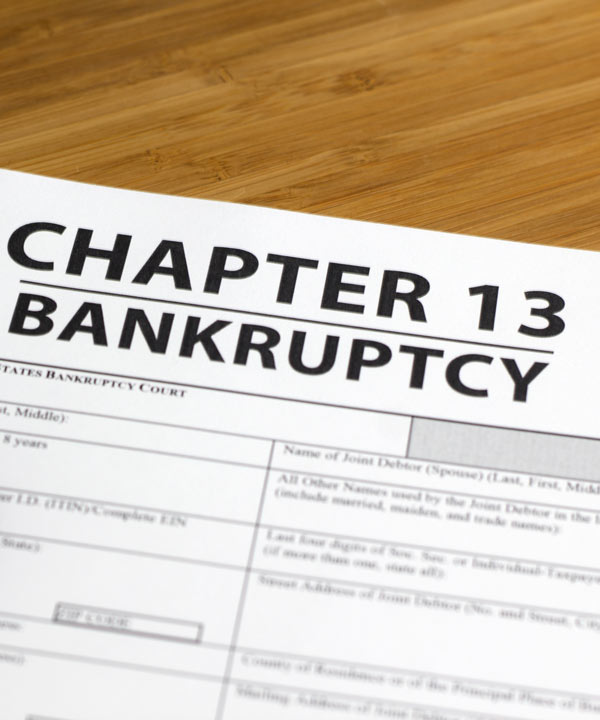Chapter 7 vs Chapter 13

How do i decide whether chapter 7 or chapter 13 bankruptcy is best for me?
In a chapter 7 bankruptcy, you pay creditors out of non-exempt property owned at the time of filing.
In a chapter 13 bankruptcy, you keep all assets owned (even those that are not exempt under chapter 7) at the time of filing and pay creditors out of future income over 3 to 5 years.
If you are like most people, all or most of your property will be exempt from creditors. If so, chapter 7 bankruptcy is generally a simpler, less expensive, and without losing any of your property.
HOWEVER, CHAPTER 13 BANKRUPTCY MAY BE YOUR BEST OPTION IF, ONE OR MORE OF THE FOLLOWING APPLY:
- Eliminate the legal obligation to pay most or all of your debts (this is known as “discharge” of debts).
- Stop foreclosure on your house, townhome, condominium, or mobile home and allow you an opportunity to catch up on missed payments over a longer period of time.
- Prevent repossession of a car or other property, and in some instances force the creditor to return property even after it has been repossessed.
- Stop debt collection calls, letters, and other creditor harassment.
- Restore or prevent termination of utility service.
- Allow you to challenge the claims of creditors who have committed fraud or who are otherwise trying to collect more than you really owe.
- Allow you to continue occupying a rented town home or apartment for additional time.
TYPES OF BANKRUPTCY
CHAPTER 7 BANKRUPTCY
Chapter 7 Bankruptcy is an orderly, court-supervised procedure by which a designated official known as a “Trustee” collects all of the person’s non-exempt property, reduces it to cash, and distributes it to creditors as required by law. The key point here is that only “non-exempt property” is collected and sold to pay off creditors. Only rarely will there be non-exempt property in a Chapter 7 case.
As such, most people keep all of their property! People who file Chapter 7 Bankruptcy typically receive discharge within just a few months of filing for bankruptcy. At that time, the person is released from any further obligation to pay all dischargeable debts. Amazingly, it is not unusual for people to eliminate literally tens of thousands of dollars or more in medical debt, credit card debt, payday loans, court judgments, debt from a failed business, personal guarantees, even certain federal income taxes over 3 years old, etc.
Important in a Chapter 7 Bankruptcy is that you will need to be current on and continue making required payments on any loan you used to purchase your home or vehicle or the like (secured loans). If not, the creditor may be able to take back the property unless you instead file a Chapter 13 Bankruptcy and repay the delinquent amounts over time.
Also, Chapter 7 may not be available for persons who have a large amount of income remaining after paying for their living expenses and payments on loans used to purchase their home or car, etc. For a more thorough explanation of Chapter 7 Bankruptcy in comparison to Chapter 13 Bankruptcy, click on Chapter 7 vs. Chapter 13
CHAPTER 11 BANKRUPTCY
Chapter 11 (reorganization which is used by wealthy persons and corporations such as K-Mart and Continental Airlines)
CHAPTER 12 BANKRUPTCY
Chapter 12 (intended for family farmers and fishermen).
CHAPTER 13 BANKRUPTCY
Chapter 13 Bankruptcy is designed for individuals with a regular source of income. Chapter 13 enables a person to pay back debt without being reChapter 13 Bankruptcyquired to sell off non-exempt assets as is required under Chapter 7 (although you can selectively “surrender” certain property which you owe more than it is worth or just simply don’t want). Instead, some or all of one’s debts are paid out of future income, after accounting for living expenses, over 3 or 5 years, based on a court approved repayment plan. The plan will not require that a person pay all of their unsecured debt over that time unless they have enough income to do so after subtracting living expenses and payments on debt secured by property they decide to keep. In fact, some Chapter 13 plans don’t provide much money, if any, to unsecured creditors such as judgment creditors, credit card companies, medical bill collectors, etc. It is not uncommon for a person to permanently eliminate literally tens of thousands of dollars of debt. Many people find Chapter 13 Bankruptcy preferable based on their situation. For a more thorough explanation of Chapter 13 Bankruptcy in comparison to Chapter 7 Bankruptcy, click on Chapter 7 vs. Chapter 13
PROUD MEMBER OF

Member Since 2008
GOT A QUESTION?
WANT TO GET STARTED?
You Deserve A Fresh Start & Peace of Mind, Schedule Your Free Initial Consultation
WE ARE A DEBT RELIEF LAW FIRM.
We Help People File For Bankruptcy Relief Under The Bankruptcy Code.

